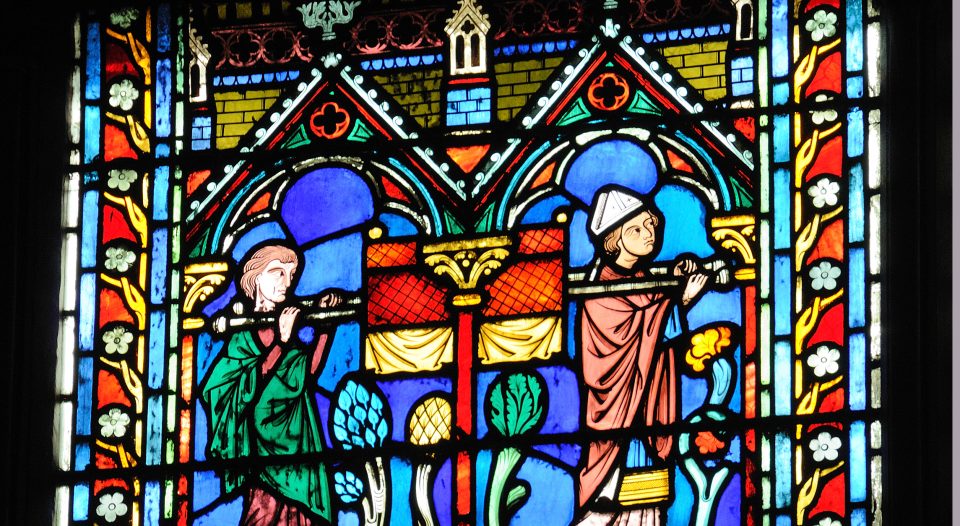Lectionary for July 14, 2024
Eighth Sunday after Pentecost
2 Samuel 6:1-5, 12b-19; Psalm 24;
Ephesians 1:3-14; Mark 6:14-29
Much like the entrepreneurial world, the church-planting/new start world has a problem of moving from launching to scaling. Launching a new worshiping community is fun but also a ton of work. My good friend, Sawyer Vanden Heuvel, started a worshiping community in Sioux Falls, S.D., called Shepherd’s Table, and it has been a great joy to watch from afar as it coalesces and grows.
The trick with new communities (and even those that are more established) is providing a gentle and welcoming on-ramp for people who are just coming to faith while giving believers the opportunity to grow deeper in love, service, learning and wisdom. Too often our communities are either “seeker-friendly” or “believer-oriented” (I know those terms are problematic). Pastor Sawyer and many others do a great job of creating communities that are open and accessible while at the same time being challenging and enriching.
The lectionary passages this week can, at least initially, be bewildering. David dances in a sleeveless shirt (and maybe nothing else?); Herod kills John the Baptizer. You would never preach these stories to new Christians, right? And what do these stories mean for those saints who have been walking with God and members of the body of Christ for decades? Yet I think this week is a treasure, because it allows us to practice what Paul preaches and “become all things to all people” in order to share in the blessings of the gospel (1 Corinthians 9:22-23). The passage must be read as relating to people where they are at.
After a conflict at the border, the Philistines defeated Israel and stole the Ark of the Covenant—God’s throne on earth and the container of all the commandments from Sinai (1 Samuel 4:4-11). God judged the Philistines and punished their cities that contained the ark (after seeing what happened in Ashdod and Gath, the Philistine residents of Ekron wisely suggested that the ark be given back to the Israelites). So they sent the ark back on a cart pulled by animals. When the Israelites received it, however, some foolish men of Beth-shemesh wanted to look inside, and many of them died. The Israelites then asked the residents of Kiriath-jearim, especially Abinadab, to take the ark. The men of Kiriath-jearim carried it up the hill, and the ark blessed the household of Abinadab for over 20 years (1 Samuel 7:1).
David sought to bring the ark from Abinadab’s house to the prepared site in Jerusalem. Yet he made a crucial error: David put the ark on a cart like the Philistines had. When the cart hit a bump causing the ark to almost tumble, Uzzah reached out to stabilize it. But you simply cannot touch God’s throne, and Uzzah was killed like the men of Beth-shemesh decades earlier (2 Samuel 6:6-7). The ark was then brought to Obed-edom’s house while David figured out what to do next.
Wherever we are on our journey—new seeker or seasoned follower—God’s word is a gift to provide what we need to curb, mirror or guide.
Interestingly, Obed-edom was a Philistine from Gath, one of the cities that the ark had laid waste. The reader naturally expects that his house would be destroyed by the ark’s presence. Yet, the opposite happens. God blessed Obed-edom and all that belonged to him (2 Samuel 6:11-12). When David heard that the ark could be a source of blessing, he had his men carry it into Jerusalem while he danced alongside it.
The early Lutheran idea of the “three uses of the law” is pretty clear here. The first use is a curb against evil behavior. Stealing and misusing God’s stuff ended up in punishment for the Philistines, residents of Beth-shemesh and Uzzah. The second use of the law, to hold a mirror up to people to show their sinfulness, is especially apparent in David. He wanted to bring God’s throne into his new capital of Jerusalem, but he didn’t show respect or obedience to God. He needs a savior—or at least a different relationship with God. The third use of the law is to provide guidance for those who are right with God. The wise men of Kiriath-jearim and Obed-edom were guided by respect and love for God that they manifested in caring for God’s throne and commandments.
Crucially, the ark, which manifests God’s power, doesn’t discriminate on the basis of ethnicity or national identity. Israelites and Philistines who needed to have their behavior curbed were punished. Those who needed to be humbled—even the king of the Israelites—were humbled. And those who sought to obey and honor the God who knows and loves them were guided into right behavior—again, Philistine and Israelite alike.
Wherever we are on our journey—new seeker or seasoned follower—God’s word is a gift to provide what we need to curb, mirror or guide.





